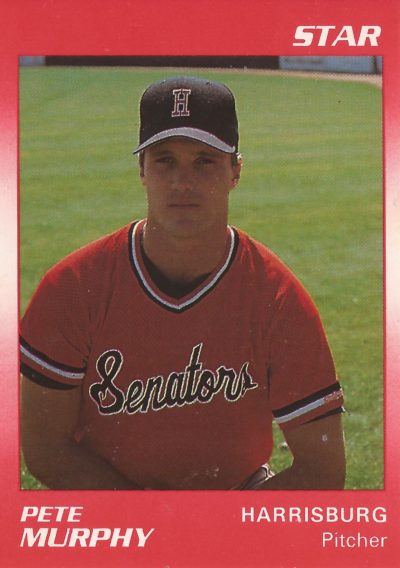Advertisement
'Hell On Earth': How Former Minor Leaguer Pete Murphy Survived 9/11
Resume
Pete Murphy grew up in the New York City borough of Queens. By the age of 2 he was swinging a baseball bat, his father would always say. Pete played baseball and football at his high school in Flushing and at college, just across the East River, at Columbia University in Manhattan.
Pete emerged as a pitcher with enough talent to make the pros, though he says he never expected to be drafted. In the spring of 1986, he took the mound for the last start of his college career, a game against Harvard.

"And then, when I was warming up before the game, the coach came out to me and he said, 'Pete, we really need this one,' " Pete says. "We had lost the game before, and I think we split the day before. So in order to make the playoffs, we really needed to have a win. So, nothing like a little added pressure before going out there on the mound."
Pete delivered, tossing a two-hit shutout with 11 strikeouts. A scout for the Pittsburgh Pirates was there, and he took notice.
But Pete didn’t know that. He graduated and started work at a law firm. The Pirates had other plans.
"I got a call from my brother who said, ‘Well, the Pirates just called the house and said they drafted you in the 23rd round,' " Pete says. "So I proceeded to walk into my boss, [I] said, 'Been nice working here for the two or three weeks' — whatever it was — but I gotta go.' "
A Pro Baseball Career
The Pirates sent Pete to Florida as a member of the Single-A Bradenton Marauders.
After Bradenton, it was back to New York — upstate — for parts of the 1986 and 1987 seasons with the Watertown Pirates. Pete also played minor league ball in Macon, Georgia and Harrisburg, Pennsylvania, climbing the ranks to Double-A.
Pete says he loved getting to know each of the cities along his journey through the minors. Still, those places weren’t New York.
"What did you miss most about New York? Was it the pizza?" I ask.
"Well, that was the biggest adjustment. In the other towns, if it was 10 p.m., you were struggling to find some place," Pete says. "I remember there was one time after a game. It went extra innings, we were all in the hotel — we were just south of D.C. And we were just in a hotel off of [I]95 down there. And there was nothing around. It's not like we could even go and walk somewhere. I ended up having to bribe the one pizza place that was open in order for them to bring pizzas — I had to bribe the guys like $20 or something.
"And then the kicker of it, the pizza ended up making us all sick."
Coming Home
At the end of every season, Pete would drive himself back home to New York.
"The best part was always coming up the Jersey Turnpike and when you can see the twin towers. And I knew I was home when I could start seeing the skyline of New York," Pete says.
"I knew I was home when I could start seeing the skyline of New York City."
Pete Murphy
In 1991, Pete was stuck in Double-A with little hope of breaking through. He gave up his Major League aspirations. He moved back to New York City and put his computer science degree to use. In 1995, he got a job in application development for the investment banking firm Lehman Brothers.
In January 2001, the company moved some of its employees into offices in the World Trade Center’s north tower. Pete was excited to work in a building his father had helped construct.
"We had the 38th, 39th and 40th floors," Pete says. "I was on the ... kind of the Eastern-facing side, so I was overlooking the plaza and looking out towards Queens. So I'd always feel like I was overlooking home when I was looking out that way."
The Morning Of 9/11
On the morning of 9/11, Pete was at work early, preparing for meetings across the street in the company’s headquarters.
His boss went down from the 38th floor for a cigarette. Pete prepared to follow.
"Gathered my stuff — I guess it was just about 8:40ish — and went to get on the elevator," Pete says.
Then he remembered he’d left something at his desk.
"So I walked back to my desk. And, just as I got to my desk, that's when the first plane hit," Pete says.
From inside the building, Pete says it sounded like a loud "bang."
"The building moved so much that I actually stumbled, and I had to grab onto the cubicle wall," he says. "I remember saying to myself, 'Holy cow, this is going to be a long ride down.' Because it literally felt like the building was going to topple over."
Getting Downstairs
Pete didn’t know exactly what had happened, but he knew he needed to move. He made it to the stairway, which was already filled with people.
"Everybody's kind of talking about, you know, 'What was that? What was that?' " Pete says. "And eventually we started getting reports on the pagers that the tower was hit by a Cessna. And everybody, when they saw that, they're like, 'There is no way that was a Cessna that hit this building.' "
The scene got more tense. At times, the line down the stairs stopped moving. People started yelling.
"People from the upper floors started coming down, like, the injured people. And all of us, we ended up making a single file and kept the left-most lane open for the people coming down. They were, you know, injured and bloody. And your imagination starts going off. 'Well, it must be just kind of like hell on earth up there.' ”
People were panicked. But at this point, Pete says, no one knew the tower was on the verge of collapse. He didn’t even know the other tower had been hit.
Firemen arrived, climbing up, and so Pete decided to seek an alternative, less-crowded route. He found an emptier stairway.
By the time Pete reached the ground floor, he’d heard that this was an act of terrorism. The lobby was almost unrecognizable from the damage.
Pete and the others were sent out via the mall underneath the World Trade Center.
"They didn't want anybody walking across the plaza. Because, at that time, the jumpers from up top had started also," Pete says.
Pete eventually emerged from behind Trinity Church, several blocks away.
"That was kind of the first exposure I had to really the scale of what was going on," Pete says. "There was blood all over the street. I stopped, took a second and looked up at the buildings — and that's when I saw all the smoke pouring out of the buildings. And [I was] just thinking, 'This is not good. Not good at all.' "
"[Mary] was kinda set in her mind at that point that I wasn't around anymore."
Pete Murphy
Pete needed to find a way out of Manhattan. And he needed to let his family know he was OK. He found a working payphone and left a message on his home answering machine. But his wife, Mary, was at her parents’ house, following the news on TV.
"And she's hearing all the 9-1-1 calls, and they're telling people to stay in the building and not to leave," Pete says. "And she actually checked our answering machine at home. And as she was listening to me on the answering machine, she was watching the building come down on TV. And she was kinda set in her mind at that point that ... that I wasn't around anymore."
Coming Home
Pete spent two hours trying unsuccessfully to get out of Manhattan. Eventually, he made his way to the Midtown Tunnel, hitched a ride and learned from the driver that the building he was working in just hours earlier was no longer there.
When Pete made it back across the East River and home to Queens, he stopped to look at the spot where the towers had stood.
"I still had kind of the shadow of the twin towers being there — like, in my eyes, they were still there," Pete says. "And the smoke was coming up kind of through the shadow of the twin towers."
"What was that moment like when you finally reconnected and reunited with your family?" I ask.
"We were kind of very numb," Pete says. "[Mary] was kind of adjusting to me not being around anymore. So she was kinda just pinching me a bit. We hugged. And our lives have not been the same since."
I asked Pete Murphy if he ever thought about what might have happened if he hadn’t left baseball and ended up at Lehman Brothers. If he had made it to the Major Leagues, maybe he wouldn’t have been in the north tower on the morning of 9/11.
"There's all those forks in the road that you come to in your life," he says. "And, you know, I think everything worked out the way it was supposed to. You know, I got to live the dream for six years. It didn't end up the way I had hoped, but I like to think that, you know, I got the taste, and I'm where I'm supposed to be right now with who I'm supposed to be with.
"And I really wouldn't — I honestly really don't think, if I had the choice, that I would change it."
We first learned about Pete Murphy's story in a piece written by Steve Cook for his website about minor league baseball, The Greatest 21 Days.
This segment aired on September 14, 2019.
